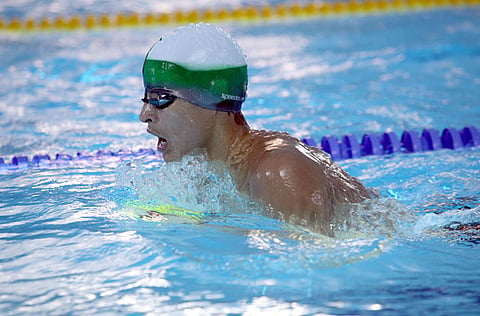Velimir inspires Dubai swimmers
Fernandes and Mensil eye debut World Cup springboard

Dubai: Following Dubai-based Velimir Stjepanovic’s inspirational sixth-placed finish in the London Olympics 200m butterfly final last month, city swimmers have hit the pool with renewed conviction.
Among them is a group preparing for their FINA/Arena Swimming World Cup debut in the 2012 series’ first leg, which will be held at Dubai’s Hamdan Bin Mohammad Bin Rashid Sports Complex from October 2 to 3.
Marco Fernandes and Ella Mensil, both 15, are training nine sessions a week in the run-up to the competition in the hope of shaving seconds off their personal bests in time to face the world’s elite.
This was the event that put renowned local and upcoming swimmers Stjepanovic and Gwen Van Beek through their paces this time last year, so Fernandes and Mensil’s coach, Konstantin Bushmelev of Sports Life Swimming Club, is hopeful of what’s ahead.
Serbia’s Stjepanovic, 18, went on to hold his own with the likes of Chad Le Clos and Michael Phelps right up until the 150-metre mark of this summer’s Olympic final. Meanwhile, Holland’s Van Beek, 17, competed in the Dutch nationals after impressing in the World Cup against her compatriot, current 50-100m freestyle Olympic gold medallist Ranomi Kromowidjojo.
Those are honours Bushmelev believes are just waiting to be emulated by his protégés, as long as they continue to put in the hard work.
“If the coach, swimmer and the swimmer’s family are all of the same understanding you can achieve something,” said Bushmelev. “Velimir and Gwen’s success has helped underline to all of us why we need to be in training so often. Now they can see if Velimir and Gwen can succeed, we can all succeed.
“Coaches all over the world are basically teaching students the technical ability to move through the water using more speed and less energy. But examples like Velimir give the whole group something extra, which is spirit,” said Bushmelev.
Mensil, originally from Buckinghamshire in England, currently swims the 100-metre backstroke in 108 seconds, down from 119 at the beginning of the year. She attributes her progress to the use of the new state-of-the-art facilities at the Hamdan Sports Complex and the role models it has already produced.
“Seeing people you know achieve and knowing that you yourself could be as good as them, really spurs you on,” said Ella.
“I know Gwen quite well, and seeing her get into the Dutch nationals has inspired me to target the Great Britain squad. I’d like to think my backstroke is comparable to her butterfly and breaststroke.”
Fernandes, originally from Johannesburg, South Africa, currently swims 50m breaststroke in 34.1 seconds, down from 38 one year ago once he mastered his underwater technique.
Marco said: “The World Cup is a stepping stone that will allow me to gain more experience. In all my time in racing, I’ve not exactly put the power in. I’ve only been focused on tactics and technique until now, but I’m prepared to combine the two fully for this event. I’d be really happy if broke my personal best and got a medal.”
Mensil and Fernandes are closely followed by Denmark’s Soren Villumsen, 14, and Greece’s Panagiotis Chazigeorgiou, aged 12. Although too young to compete in the World Cup, their times have decreased most dramatically, with Soren down to 29.5 seconds in the 50-metre butterfly and Panagiotis swimming 50-metre freestyle in 29.9 secs, 100-metre freestyle in 105 secs and the 50m butterfly in 33.2.
And Bushmelev hopes that after October it will be this second line of development, with two generations of role models ahead of them, that will keep the start of a talent cycle, buoyed by the new facilities, on course.



